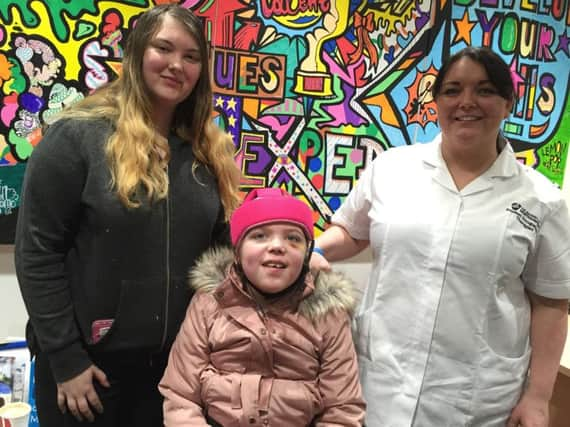Student mum from Northampton: 'I'm taking therapy course to help find cure for my daughter's one-in-a-million brain disease'


Nine-year-old Heidi is just one of 100 people in the world with BPAN, or beta-propeller protein assisted neurodegeneration.
First year occupational therapy student and Heidi's mother Kerry Cooke says her little girl is the greatest inspiration she needs to succeed in her studies.
Advertisement
Hide AdAdvertisement
Hide AdKerry, aged 38, explained: “I originally came into occupational therapy because Heidi was delayed developmentally.
"But upon diagnosis late last year it became clear that she isn’t delayed, she’s declining. There is little research taking place around BPAN, and I am fundraising to fund further research into her condition.”
BPAN is a degenerative brain condition similar to Parkinson’s disease; the condition is fatal to most by middle age as there is currently no cure.
Kerry was inspired to study occupational therapy at the University of Northampton so she can give the best possible care for her daughter and help find out as much as possible about the condition.
Advertisement
Hide AdAdvertisement
Hide AdKerry said: “In layman’s terms, BPAN is a messed-up form of dementia.
"Heidi is non-verbal, she is doubly-incontinent so we’re changing pads, she is low-mobility. She has got severe learning disabilities – she doesn’t read or write.
“Heidi’s cognition will decline; she may lose her sight and suffer painful muscle seizures among other symptoms. She can be treated with Parkinson’s meds, but the medication also causes hard-earned loss of development."
Six years after BPAN was first identified, medical researchers are working to find a cure.
Advertisement
Hide AdAdvertisement
Hide AdDr Alison Gregory, a genetic counsellor from Oregon Health and Science University, helped with the research.
She said: “BPAN is very complicated, which is why it was so hard for us to find the gene that causes it. Symptoms that the gene change causes are early developmental delay – especially with language and many of these kids have with their motor skills.
“I hope there will be a cure in the future – that’s the goal of the very small community of us who are working on understanding and researching this disorder. We’re at the beginning of that process as we just found this gene a few years ago.
“Funding is a huge issue. There isn’t enough money for all of these rare disorders. So for us, our research would go faster if we had more money. Money speeds everything up.”
Advertisement
Hide AdAdvertisement
Hide AdKerry is now well into her first year of studies at the University of Northampton and is working hard to care for her daughter, study, and raise awareness and funds for BPAN research.
She said: “I am working to raise £1,000 to fund research into BPAN. My fellow students recently took part in a '#mannequinchallenge' to help spread the word, and the University has donated some BPAN awareness wristbands, which are on sale for £1."
There will be some activities planned to commemorate Rare Illness Day on February 27 – follow the Heidi’s World Facebook page for more information about the wristbands and other events.
“We take every day as it comes,” said Kerry. “But no matter what, she’s still Heidi.”
For more information on Heidi's condition and journey, visit her Facebook page at https://www.facebook.com/NBIABPAN/?fref=ts